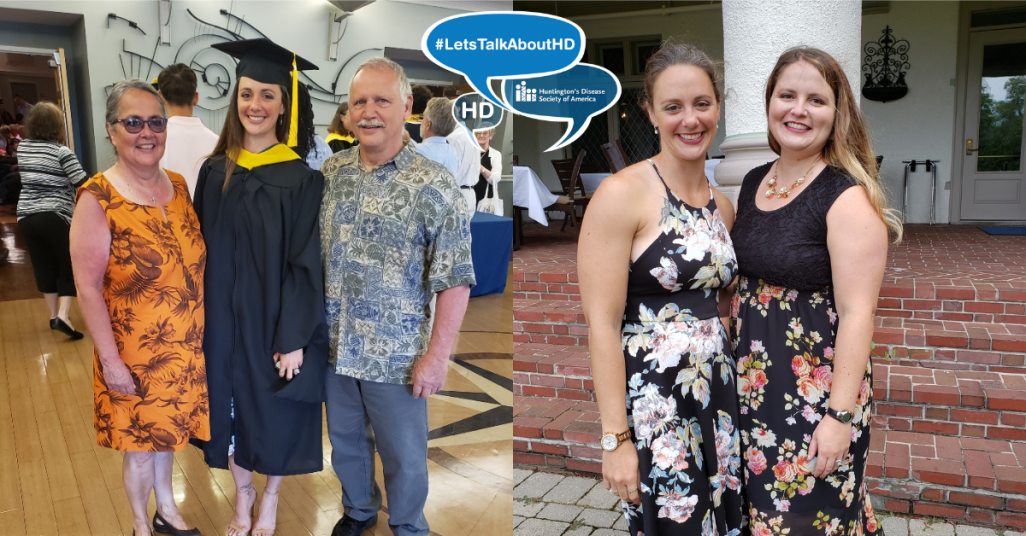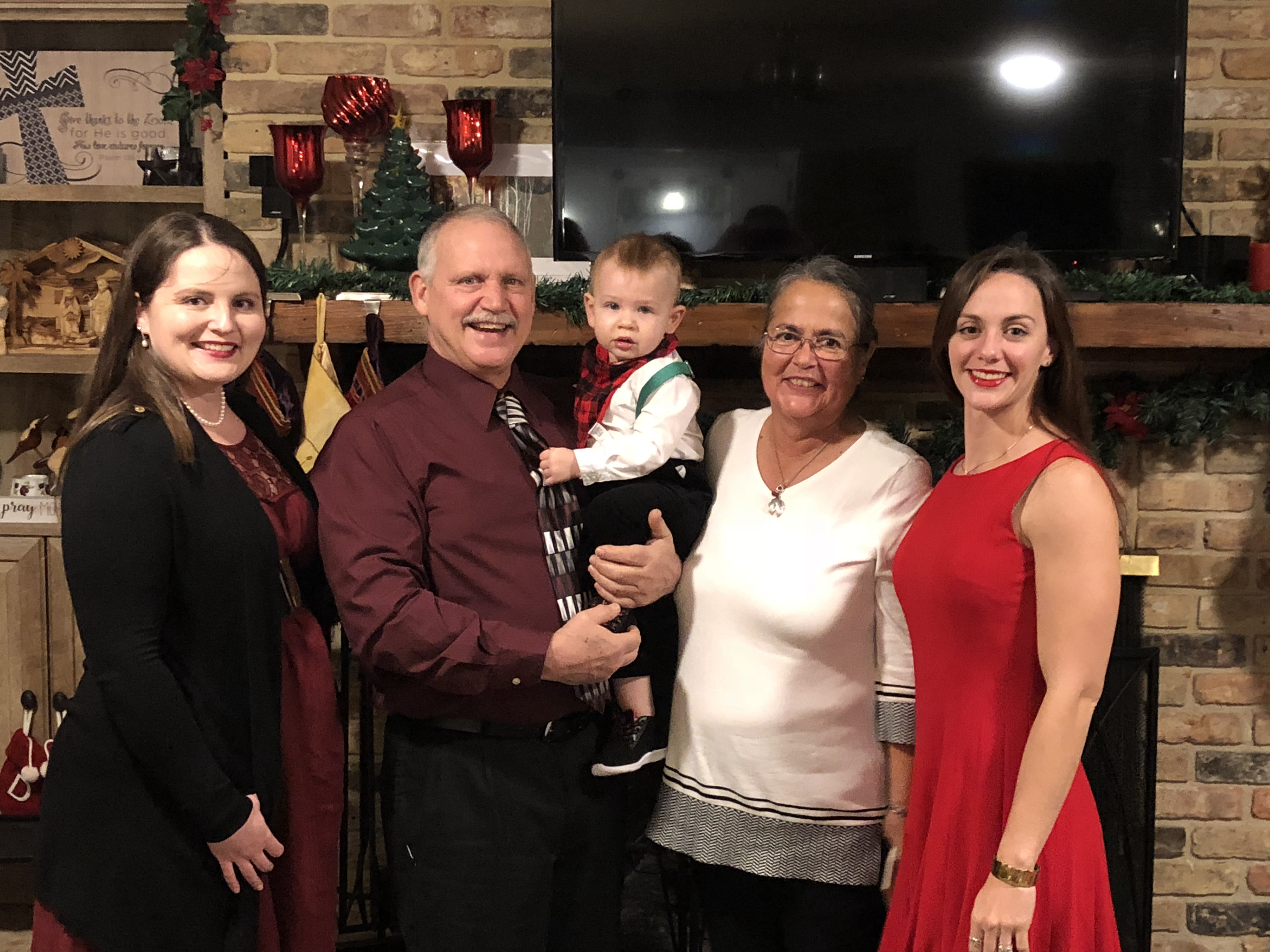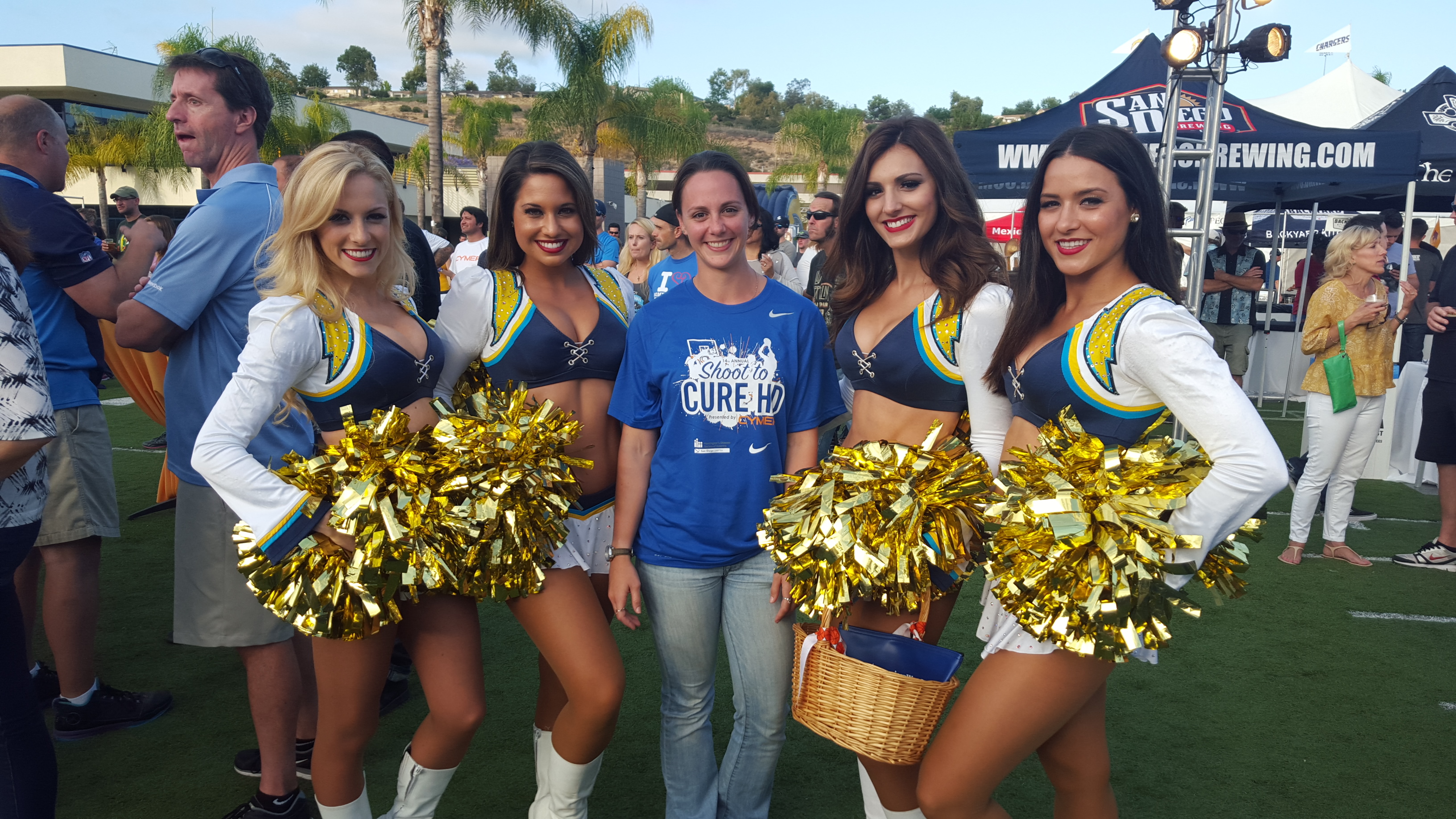
By Matthew Santamaria (msantamaria@hdsa.org)
At a young age, Virginia resident Kelly Platfoot learned about her risk of inheriting Huntington’s disease (HD).
HD is a fatal genetic disorder that causes the progressive breakdown of nerve cells in the brain. It deteriorates a person’s physical and mental abilities during their prime working years and has no cure.
Every child of a parent with HD has a 50/50 chance of inheriting the faulty gene and Kelly’s mother is one of six siblings that were at risk. In 1991, Kelly’s aunt Carolyn was first diagnosed with HD and her two children were at risk of inheriting the disease. Before testing positive for HD, her husband, Dan, noticed that she started to develop twitches.
“She lived a normal life for more than ten years before developing involuntary movements,” said Kelly.
The symptoms of HD are described as having ALS, Parkinson’s, and Alzheimer’s – simultaneously. Symptoms include personality changes, mood swings, depression, forgetfulness, impaired judgment, unsteady gait, involuntary movements, slurred speech, difficulty in swallowing, and significant weight loss.
After only two years in a new home together, Carolyn’s symptoms started to progress further and she moved into a nursing home to receive around-the-clock assistance.
Carolyn died in 2009 on Easter Day. Before she passed away, Dan recalled, “Carolyn talked more clearly than she did previously.” Both of their sons have tested positive for HD. In each of their own families, both sons adopted their own children to avoid the HD risk.
“People need to be honest and to protect others,” said Dan. “I want those to acknowledge if you are at risk.”
From Kelly’s point of view, at a young age, she noticed several symptoms in her aunt including involuntary movements, trouble speaking, and trouble swallowing food.
"I was not worried as much about my risk but my sister was more aware of HD,” Kelly explains. “At a young age, I was exposed to HD and it wasn’t terrifying.”
Kelly grew up away from her family so she did not see the day-to-day effect of someone with HD. Once the family was more aware they were at risk, Kelly’s cousins that were tested for HD would all test positive.

The decision to get genetically tested is difficult to make. Each year, 5-10% are tested. It is never the right or wrong decision to be tested. There are people that see no benefit in knowing that they will develop the disease while others want to know in order to make informed choices about their future. It can take up to several weeks to receive your results from the genetic testing center.
When Kelly first met her future husband, she explained the risk to him and was aware of her risk. He had never heard of or seen HD firsthand as they took it day by day. She made him watch any show that talked about HD.
Then, her mother got tested and, luckily, it came back negative.
Even though her mother tested negative, Kelly wants to be involved in the HD Community and wants her husband, currently serving in the Marine Corps, to meet people affected by HD to give him a better sense of what she saw as a child.

Kelly has devoted her career to Neuroscience because of how HD has impacted her life. In high school, she learned more about genetics. She has an undergraduate and master’s degree in Biology. She is currently going for her PHD in Neuroscience at the HDSA Center of Excellence at the Virginia Commonwealth University (VCU) because she wanted to help with treatments.
HDSA Centers of Excellence provide an elite team approach to Huntington’s disease care and research. Patients benefit from a ‘one-stop shopping’ approach to access expert neurologists, psychiatrists, social workers, therapists, counselors, and other professionals who have extensive experience working with families affected by HD and who work collaboratively to help families plan the best HD care program throughout the course of the disease.
Kelly has a message to the HD Community:
“You can’t give up. I wouldn’t be in a program for Neuroscience if giving up was an option.”
###
Huntington’s disease (HD) is a fatal genetic disorder that causes the progressive breakdown of nerve cells in the brain. It deteriorates a person’s physical and mental abilities during their prime working years and has no cure. Every child of a parent with HD has a 50/50 chance of inheriting the faulty gene. Today, there are approximately 41,000 symptomatic Americans and more than 200,000 at-risk of inheriting the disease. The symptoms of HD are described as having ALS, Parkinson’s and Alzheimer’s – simultaneously.
The Huntington’s Disease Society of America is the premier nonprofit organization dedicated to improving the lives of everyone affected by HD. From community services and education to advocacy and research, HDSA is the world’s leader in providing help for today and hope for tomorrow for people with HD and their families.
HDSA was founded in 1967 by Marjorie Guthrie, the wife of legendary folk singer Woody Guthrie. Woody died from HD complications when he was only 55 years old, but the Guthrie family legacy lives on at HDSA to this day.
To learn more about Huntington’s disease and the work of the Huntington’s Disease Society of America, visit www.HDSA.org or call 1(800)345-HDSA.
This is a story featuring a personal experience with Huntington’s disease. If you would like to have your story told please contact Matthew Santamaria at msantamaria@hdsa.org
At a young age, Virginia resident Kelly Platfoot learned about her risk of inheriting Huntington’s disease (HD).
HD is a fatal genetic disorder that causes the progressive breakdown of nerve cells in the brain. It deteriorates a person’s physical and mental abilities during their prime working years and has no cure.
Every child of a parent with HD has a 50/50 chance of inheriting the faulty gene and Kelly’s mother is one of six siblings that were at risk. In 1991, Kelly’s aunt Carolyn was first diagnosed with HD and her two children were at risk of inheriting the disease. Before testing positive for HD, her husband, Dan, noticed that she started to develop twitches.
“She lived a normal life for more than ten years before developing involuntary movements,” said Kelly.
The symptoms of HD are described as having ALS, Parkinson’s, and Alzheimer’s – simultaneously. Symptoms include personality changes, mood swings, depression, forgetfulness, impaired judgment, unsteady gait, involuntary movements, slurred speech, difficulty in swallowing, and significant weight loss.
After only two years in a new home together, Carolyn’s symptoms started to progress further and she moved into a nursing home to receive around-the-clock assistance.
Carolyn died in 2009 on Easter Day. Before she passed away, Dan recalled, “Carolyn talked more clearly than she did previously.” Both of their sons have tested positive for HD. In each of their own families, both sons adopted their own children to avoid the HD risk.
“People need to be honest and to protect others,” said Dan. “I want those to acknowledge if you are at risk.”
From Kelly’s point of view, at a young age, she noticed several symptoms in her aunt including involuntary movements, trouble speaking, and trouble swallowing food.
"I was not worried as much about my risk but my sister was more aware of HD,” Kelly explains. “At a young age, I was exposed to HD and it wasn’t terrifying.”
Kelly grew up away from her family so she did not see the day-to-day effect of someone with HD. Once the family was more aware they were at risk, Kelly’s cousins that were tested for HD would all test positive.

The decision to get genetically tested is difficult to make. Each year, 5-10% are tested. It is never the right or wrong decision to be tested. There are people that see no benefit in knowing that they will develop the disease while others want to know in order to make informed choices about their future. It can take up to several weeks to receive your results from the genetic testing center.
When Kelly first met her future husband, she explained the risk to him and was aware of her risk. He had never heard of or seen HD firsthand as they took it day by day. She made him watch any show that talked about HD.
Then, her mother got tested and, luckily, it came back negative.
Even though her mother tested negative, Kelly wants to be involved in the HD Community and wants her husband, currently serving in the Marine Corps, to meet people affected by HD to give him a better sense of what she saw as a child.

Kelly has devoted her career to Neuroscience because of how HD has impacted her life. In high school, she learned more about genetics. She has an undergraduate and master’s degree in Biology. She is currently going for her PHD in Neuroscience at the HDSA Center of Excellence at the Virginia Commonwealth University (VCU) because she wanted to help with treatments.
HDSA Centers of Excellence provide an elite team approach to Huntington’s disease care and research. Patients benefit from a ‘one-stop shopping’ approach to access expert neurologists, psychiatrists, social workers, therapists, counselors, and other professionals who have extensive experience working with families affected by HD and who work collaboratively to help families plan the best HD care program throughout the course of the disease.
Kelly has a message to the HD Community:
“You can’t give up. I wouldn’t be in a program for Neuroscience if giving up was an option.”
###
Huntington’s disease (HD) is a fatal genetic disorder that causes the progressive breakdown of nerve cells in the brain. It deteriorates a person’s physical and mental abilities during their prime working years and has no cure. Every child of a parent with HD has a 50/50 chance of inheriting the faulty gene. Today, there are approximately 41,000 symptomatic Americans and more than 200,000 at-risk of inheriting the disease. The symptoms of HD are described as having ALS, Parkinson’s and Alzheimer’s – simultaneously.
The Huntington’s Disease Society of America is the premier nonprofit organization dedicated to improving the lives of everyone affected by HD. From community services and education to advocacy and research, HDSA is the world’s leader in providing help for today and hope for tomorrow for people with HD and their families.
HDSA was founded in 1967 by Marjorie Guthrie, the wife of legendary folk singer Woody Guthrie. Woody died from HD complications when he was only 55 years old, but the Guthrie family legacy lives on at HDSA to this day.
To learn more about Huntington’s disease and the work of the Huntington’s Disease Society of America, visit www.HDSA.org or call 1(800)345-HDSA.
This is a story featuring a personal experience with Huntington’s disease. If you would like to have your story told please contact Matthew Santamaria at msantamaria@hdsa.org
